📍 Introduction
ChatGPT is revolutionizing the way software developers work and if you haven't jumped on board yet, you're missing out on a competitive edge. In this blog, I will give you a grand tour of ChatGPT. Demonstrating how it can supercharge your daily tasks and elevate your efficiency. Don't get left behind, discover how to harness the power of ChatGPT and stay ahead in this rapidly evolving world of software development.
📍 Understand Confusing Code <>
ChatGPT knows a lot about programming languages and can explain how different parts of code work in a simple way:
squared_numbers = [(lambda x: x**2)(num) for num in range(1, 11)]
For example, we have this Python code that uses some advanced features like list comprehensions and lambda functions. If we don't know what's going on or find the code hard to read, we can ask ChatGPT to explain it:
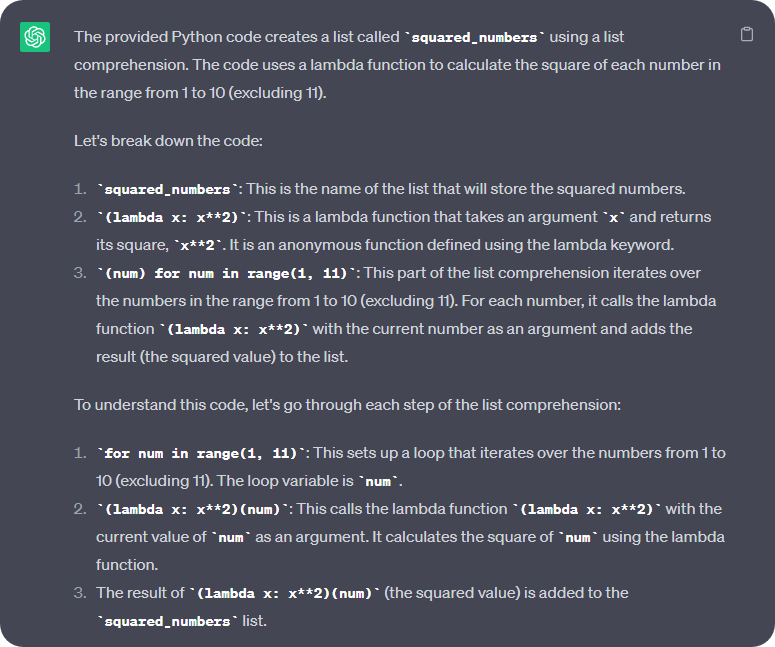
With ChatGPT's help, we can better understand the code we're working with and feel more confident when dealing with complex code.
📍 Improve & Debug Code <>
ChatGPT can help us spot mistakes in our code, can help us debug it and suggest improvements. While coding It's common to find that something isn't working as expected. ChatGPT can look at our code and point out any errors or areas that might need fixing. It can also offer suggestions on how to make our code better:
def count_factors(n):
count = 0
for i in range(1, n + 1):
if n % i == 0:
count += 1
return count
number = int(input("Enter a number: "))
print("Number of factors:", count_factors(number))
We asked ChatGPT to improve the above Python code. It tells us what can be improved and it even generates the correct code for us!
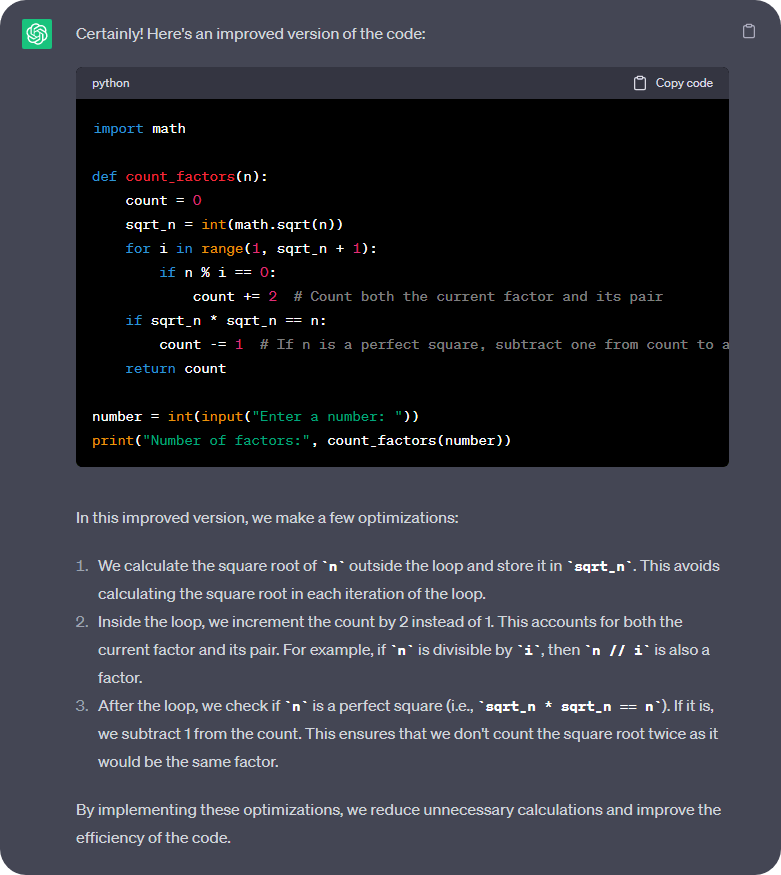
📍 Translate Code <>
Another useful way to use ChatGPT is to translate code from one programming language to another. This can be helpful if we get a solution in one language, but our project is in a different language. ChatGPT knows many programming languages, so it can help us make the switch.
For example, we got a Fibonacci function in Python which we want to write in Java, ChatGPT can help us do that:
def generate_fibonacci_series(n):
fibonacci_series = []
if n <= 0:
return fibonacci_series
# Initialize the first two numbers in the series
fibonacci_series.append(0)
if n > 1:
fibonacci_series.append(1)
# Generate the Fibonacci series
while len(fibonacci_series) < n:
next_number = fibonacci_series[-1] + fibonacci_series[-2]
fibonacci_series.append(next_number)
return fibonacci_series
We asked ChatGPT to rewrite this code in Java:
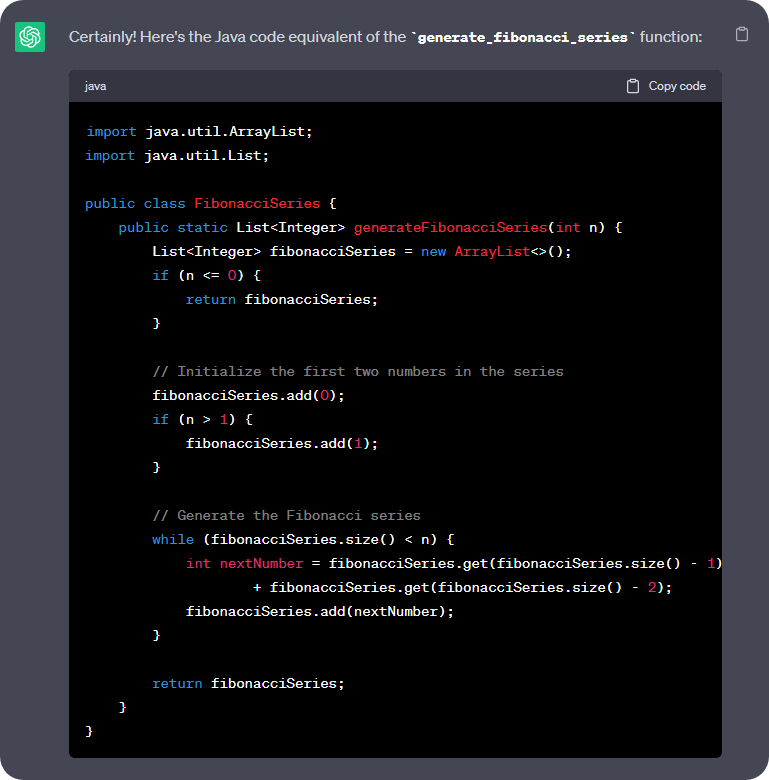
📍 Teach Code 🤖
We can take help from ChatGPT while learning a new programming language.
For example, if A person wants to learn OOPS in Java, we can ask ChatGPT to explain it in simple language:
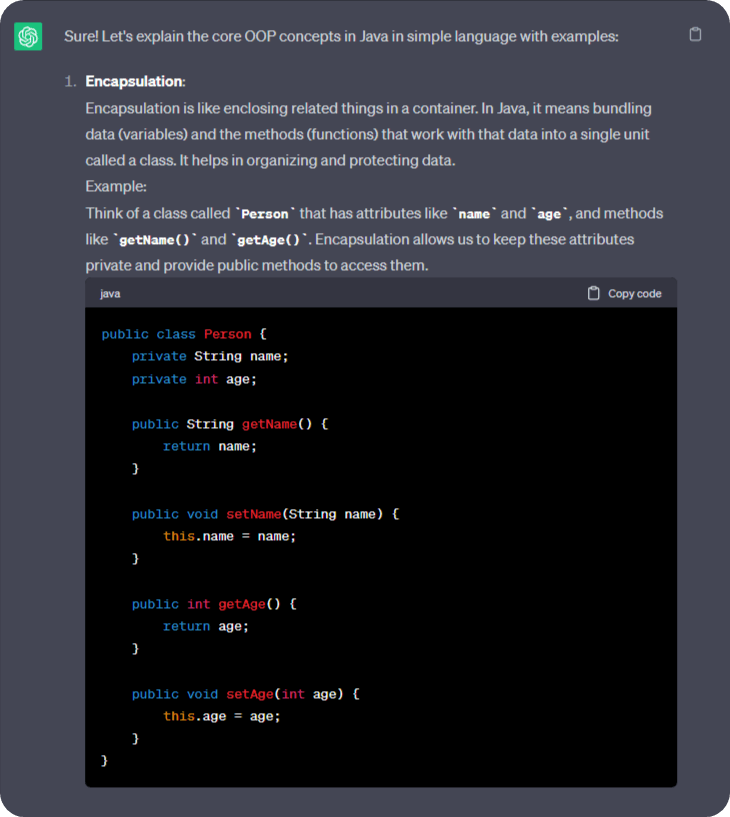
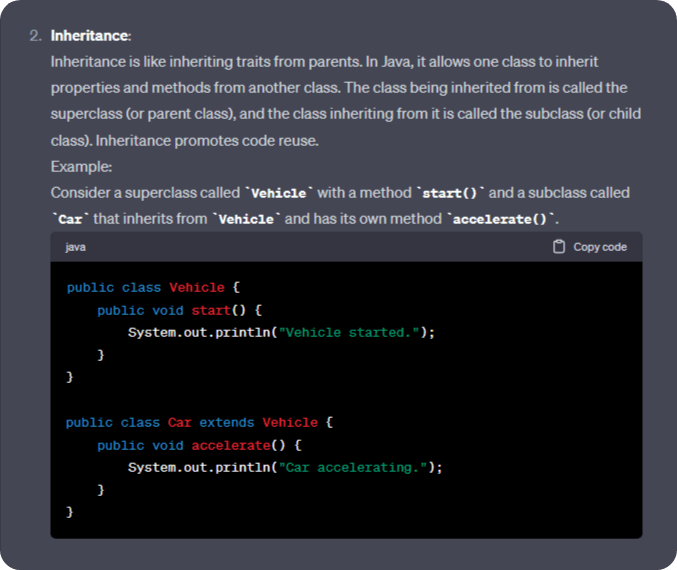
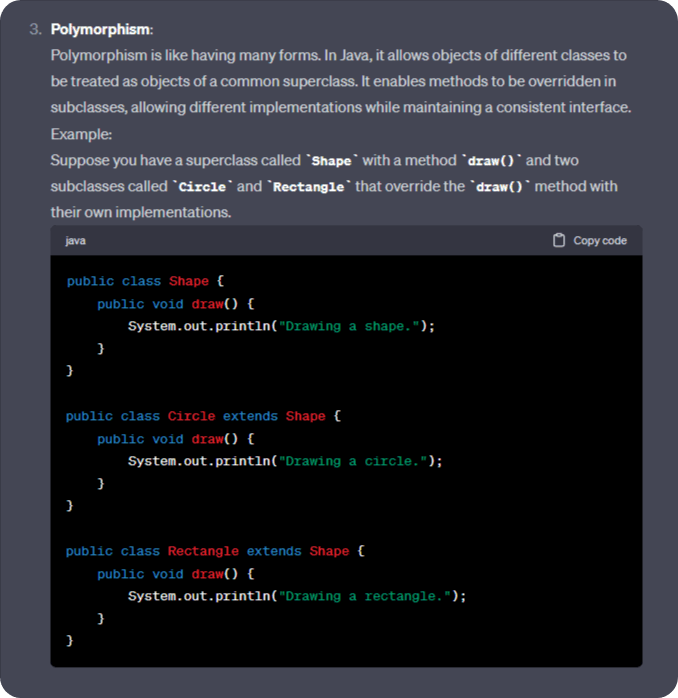
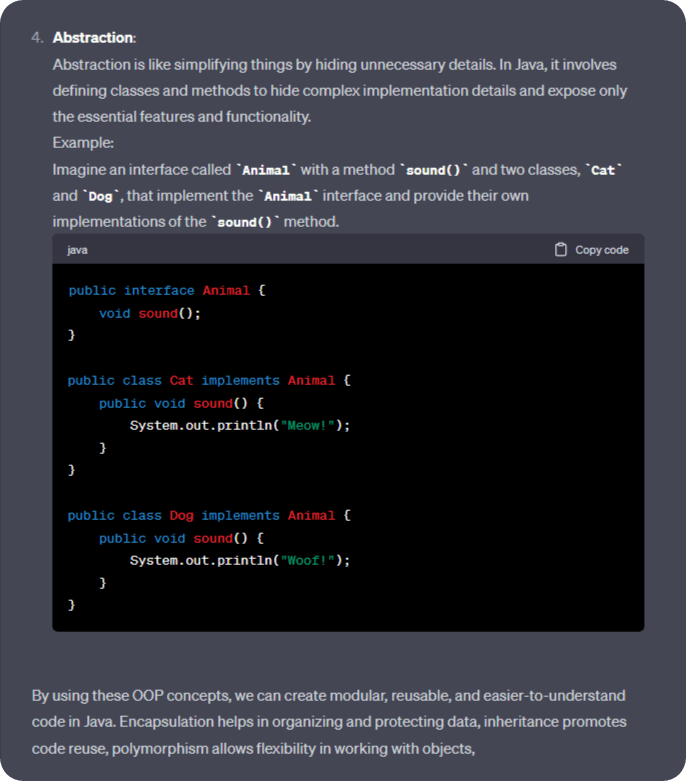
By leaning on ChatGPT when learning a new programming language/concepts, we can save time and reduce the learning curve, making it easier to adapt to new languages and become proficient in them.
📍 Automate Unit Testing ⚙
ChatGPT can help us to write unit tests for our code. Unit tests are important because they help us make sure our code is working correctly and that changes we make don't break existing functionality. Writing good unit tests can be challenging, and sometimes tedious, but ChatGPT can make it easier for us.
Let's consider a Java Sorting Function which sorts the given array in increasing order of factors count of each element:
public int countFactors(int a) {
int count = 0;
for (int i = 1; i <= Math.sqrt(a); i ++) {
if (a % i == 0) {
if (i * i == a) {
count += 1;
}
else {
count += 2;
}
}
}
return count;
}
public class FactorComparator implements Comparator<Integer> {
@Override
public int compare(Integer a, Integer b) {
int fa = countFactors(a);
int fb = countFactors(b);
if (fa > fb) {
return 1;
} else if (fa < fb) {
return -1;
} else {
if (a > b) {
return 1;
} else if (a < b) {
return -1;
} else {
return 0;
}
}
}
}
public ArrayList<Integer> solve(ArrayList<Integer> A) {
Collestions.sort(A, new FactorComparator);
return A;
}
We asked ChatGPT to come up with different test cases to validate the correctness of the above factor sort function:
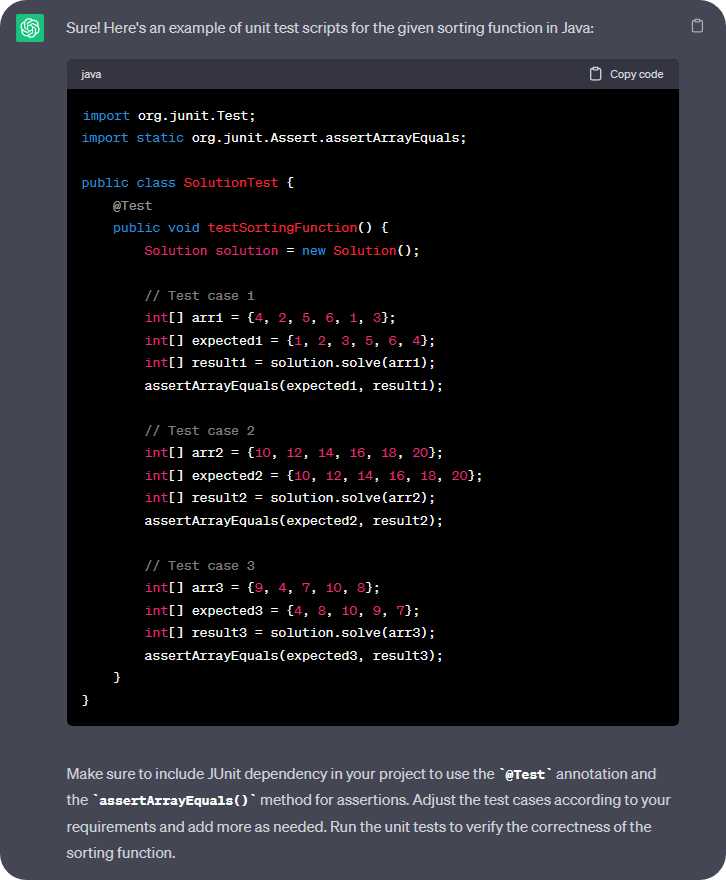
With ChatGPT's help, we can create comprehensive unit tests for real-world production code, ensuring our code is working correctly and maintaining a high level of software quality.
📍 Contribute to Code <>
With ChatGPT's understanding of programming languages and software engineering concepts, it can help us enhance our code by suggesting changes or providing new code snippets.
Let's consider a SQL Select query and we want to convert it into a pivot query:
SELECT p.product_id, p.product_name, c.category_name, s.supplier_name
FROM products p
JOIN categories c ON p.category_id = c.category_id
JOIN suppliers s ON p.supplier_id = s.supplier_id
WHERE p.product_price > 50
ORDER BY p.product_name ASC;
We asked ChatGPT to convert the above SQL query into a pivot query where c.category_name is split into two columns ('wet' and 'dry') and p.value is listed under the respective category columns:
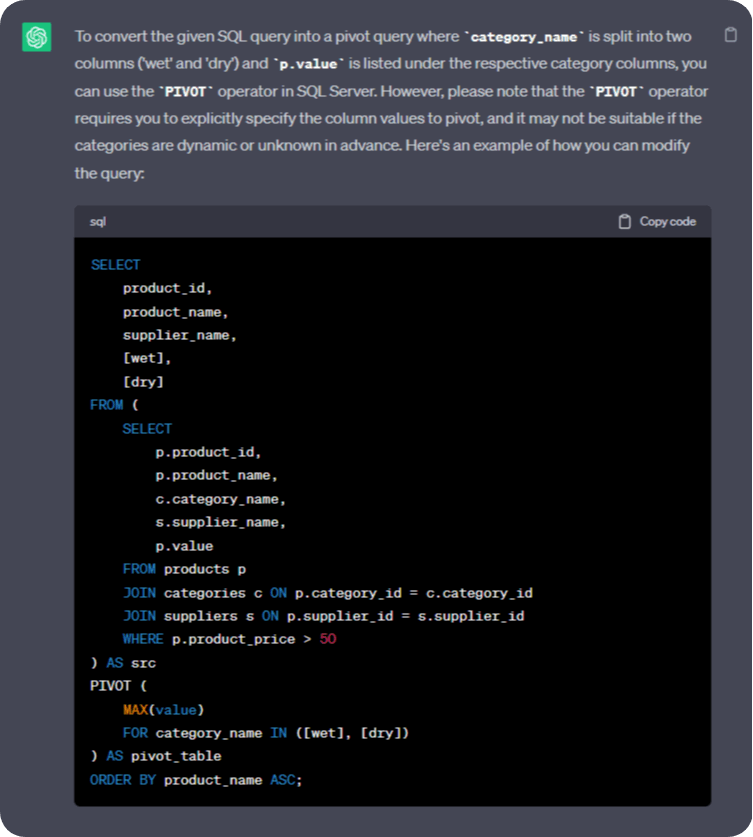
📍 Automate Code Comments/Documentation <>
Another way we can useChatGPT is to write documentation and comments for our code. Well-written documentation and comments are crucial for maintaining the readability and maintainability of our codebase. ChatGPT can help us write clear, concise and informative comments and documentation, even for complex real-world code.
Let's consider we need to add comments to the previous Java Sorting Function which sorts the given array in increasing order of factors count of each element.
We asked ChatGPT to add comments to the code (Below is the code output from ChatGPT):
public int countFactors(int a) {
int count = 0;
// Iterate up to the square root of 'a' to find factors
for (int i = 1; i <= Math.sqrt(a); i ++) {
if (a % i == 0) {
// If 'i' is a factor of 'a'
if (i * i == a) {
count += 1; // Increment count by 1 for perfect square factors
} else {
count += 2; // Increment count by 2 for other factors (pair of factors)
}
}
}
return count; // Return the total count of factors
}
public class FactorComparator implements Comparator<Integer> {
@Override
public int compare(Integer a, Integer b) {
int fa = countFactors(a); // Count factors for 'a'
int fb = countFactors(b); // Count factors for 'b'
if (fa > fb) {
return 1; // 'a' has more factors than 'b'
} else if (fa < fb) {
return -1; // 'a' has fewer factors than 'b'
} else {
if (a > b) {
return 1; // 'a' has the same number of factors as 'b', but 'a' is greater
} else if (a < b) {
return -1; // 'a' has the same number of factors as 'b', but 'a' is smaller
} else {
return 0; // 'a' and 'b' have the same number of factors and the same value
}
}
}
}
public ArrayList<Integer> solve(ArrayList<Integer> A) {
Collections.sort(A, new FactorComparator()); // Sort the ArrayList using the FactorComparator
return A; // Return the sorted ArrayList
}
By using ChatGPT to write documentation and comments, we can ensure that our code is easy to understand and maintain, making it more accessible to other developers.
📍 Word of CAUTION ⚠
It's important to remember that ChatGPT has its limitations and shouldn't be relied on blindly. Occasionally it might generate incorrect information or may occasionally produce harmful instructions or biased content.
So always think critically and ask the right questions. As software engineers, we are responsible for our code and solutions. Use ChatGPT as a helpful assistant, but make sure to double-check its suggestions and maintain control over your work.
📍 Conclusion
ChatGPT is a game-changing tool for software engineers. It helps us tackle complex tasks, understand new languages, and improve our code efficiently. By using ChatGPT, we can become better developers and make our work more enjoyable.
Let's embrace ChatGPT's potential and see how it revolutionizes the way we code!
If you like my blog then please subscribe to my newsletter and follow me on Twitter and LinkedIn.
